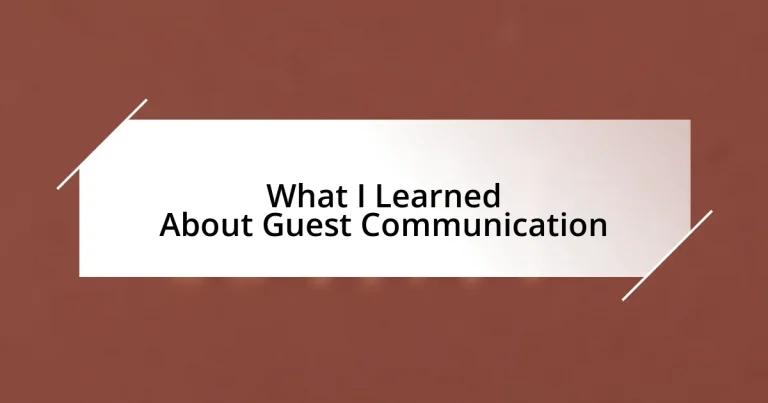Key takeaways:
- Understanding guest communication involves active listening and empathy, allowing for deeper connections beyond mere words.
- Clear messaging is crucial for preventing misunderstandings, building trust, and ensuring guests feel valued.
- Timely, personalized responses to guest feedback can transform negative situations into positive experiences and nurture lasting relationships.
- Utilizing technology enhances communication and personalization, making guest interactions more efficient and tailored to individual needs.
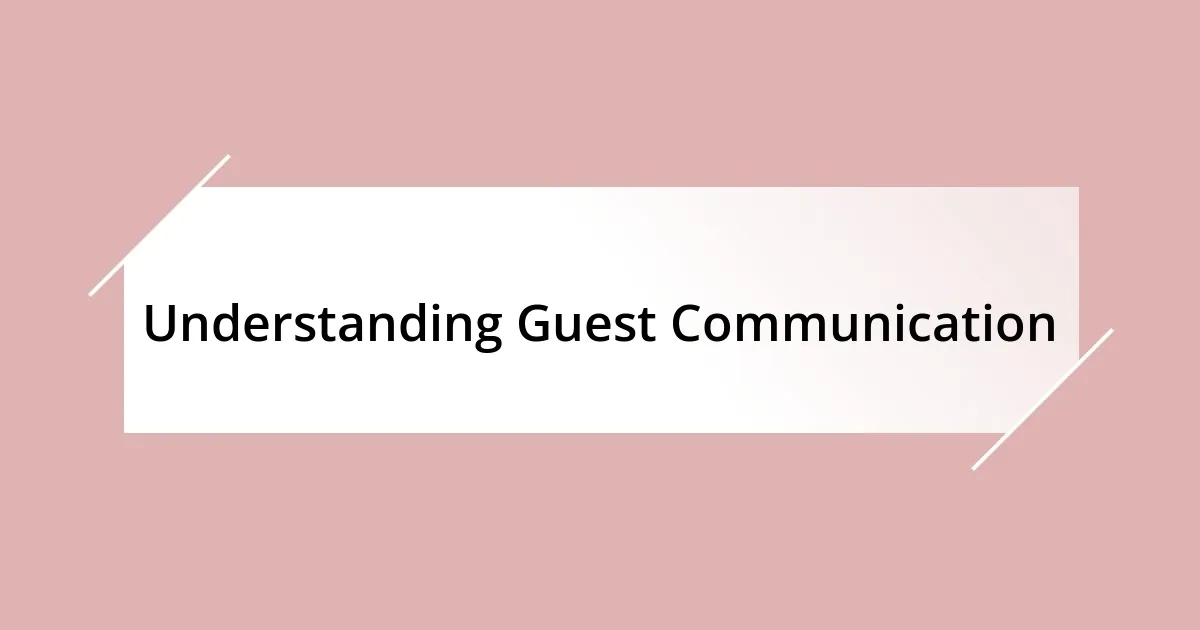
Understanding Guest Communication
Understanding guest communication is more than just words exchanged; it’s about the emotions and experiences behind those words. I remember a time when I misinterpreted a guest’s frustration as mere annoyance, but it turned out they were simply overwhelmed. Have you ever found yourself in a similar situation where understanding the underlying tone made all the difference?
Effective communication requires active listening and empathy. It’s not just about hearing what guests say; it’s about feeling what they feel. I once had a guest who seemed detached during check-in. I decided to ask them if everything was okay; it turned out they had just received difficult news. The connection formed in that moment reshaped my understanding of what it means to truly listen.
Ultimately, guest communication is an intricate dance of understanding unspoken cues and direct feedback. I’ve found that even a simple smile or genuine inquiry about the guest’s day can open up a channel for deeper conversation. Isn’t it fascinating how a small act of kindness can pave the way for a more enriching guest experience? Understanding this dynamic has truly transformed how I engage with guests.
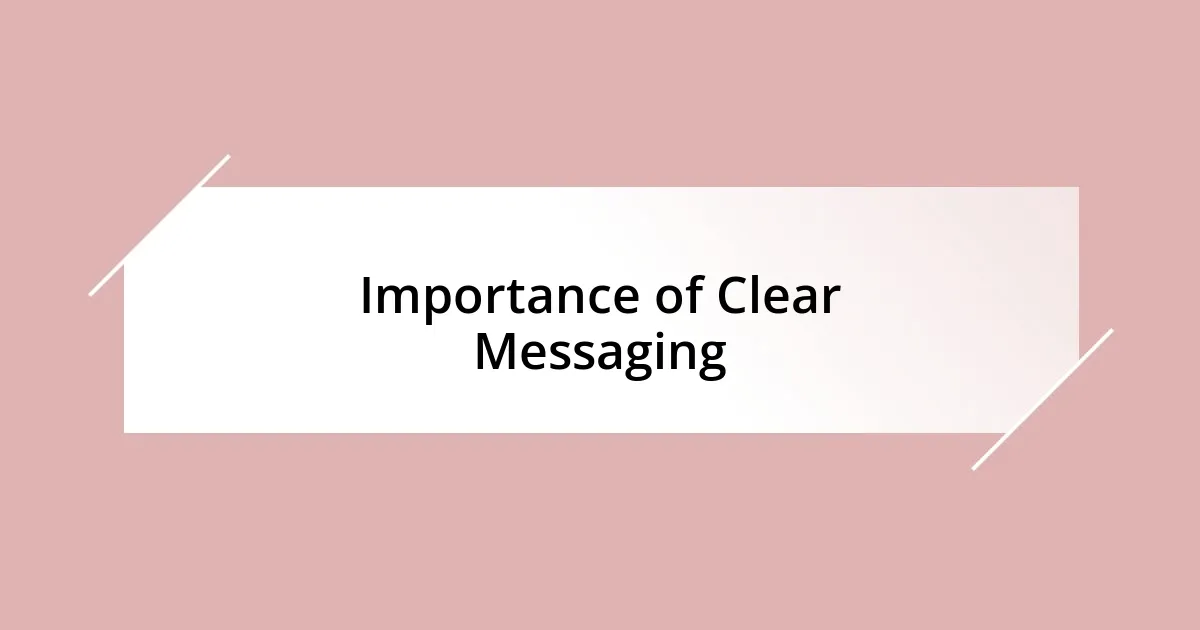
Importance of Clear Messaging
Clear messaging is the backbone of effective guest communication. I recall an instance when I sent a message regarding a schedule change, but the response I received was confusion instead of acknowledgment. It dawned on me that my wording lacked clarity. I learned firsthand how essential it is to be specific and straightforward to avoid misunderstandings.
- Clear communication helps build trust and credibility.
- It reduces the likelihood of complaints and dissatisfaction.
- It fosters a positive relationship between guests and staff.
- It ensures guests feel informed and valued throughout their stay.
When messages are direct and unambiguous, they empower guests to make informed decisions. I’ve also found that using visuals, like diagrams or infographics, alongside text can enhance understanding. There was a time I provided a map of the hotel’s amenities during check-in, and the smiles on guests’ faces showed me they really appreciated the effort. Clarity in messaging, I’ve realized, can transform a routine interaction into a seamless experience.
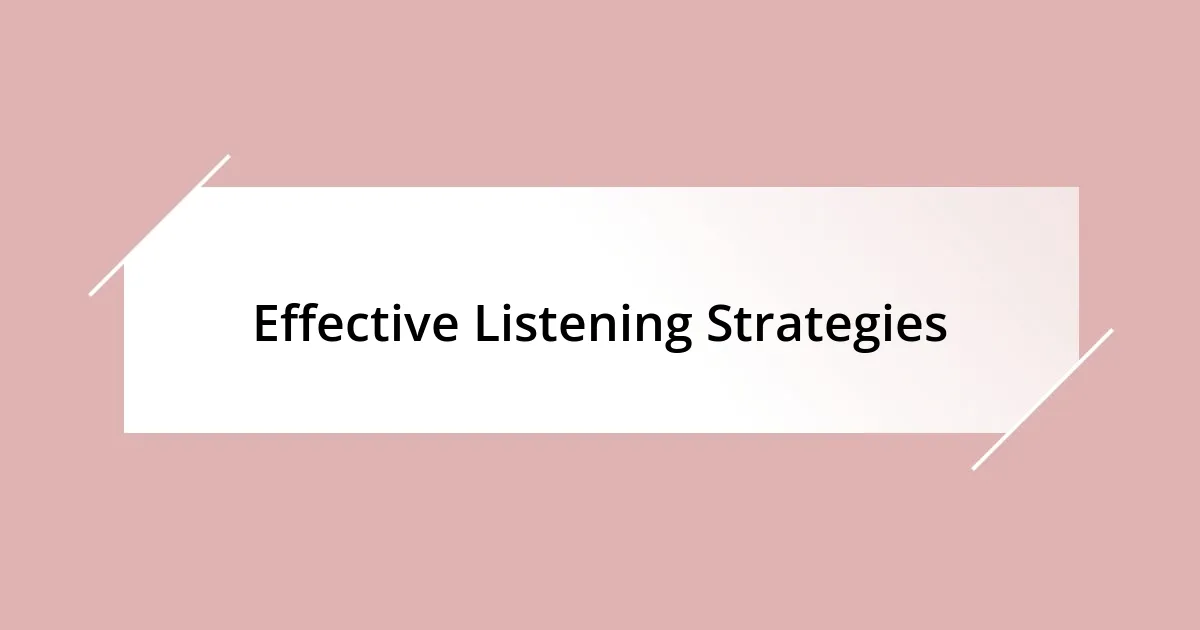
Effective Listening Strategies
Effective listening is fundamental in guest communication and goes beyond simply hearing words. I’ve found that when I truly focus on what a guest is saying, I can pick up on subtle cues that often reveal their emotions. For instance, during a conversation with a guest who seemed to be in a hurry, I noticed their voice was slightly trembling—this prompted me to slow down and assure them that we could talk at their pace. The relief in their eyes told me I had made a connection that transcended the transaction.
In practice, I’ve learned that sometimes, repeating what I’ve heard back to the guest can clarify their needs and demonstrate that I’m engaged. Once, a guest shared concerns about their room location. I mirrored back their sentiments and asked if they’d prefer a quieter area. My genuine acknowledgment led to an open discussion about alternative options, ultimately making them feel valued and understood. Isn’t it interesting how a simple technique can lead to deeper relationships?
Additionally, maintaining eye contact while listening has significantly enhanced my interactions. I recall a time when a guest shared an unsettling experience they had had outside the hotel. By keeping my focus on them, I noticed their discomfort eased as they felt seen and heard. This small act deepened our rapport and showcased the power of effective listening in turning a distressing experience into an opportunity for connection.
| Effective Listening Strategies | Description |
|---|---|
| Active Listening | Focusing fully on the speaker, avoiding distractions to capture their message wholly. |
| Mirroring | Repeating back what the guest has said to confirm understanding and show engagement. |
| Maintaining Eye Contact | Keeping eye contact to convey attentiveness and empathy, encouraging open communication. |
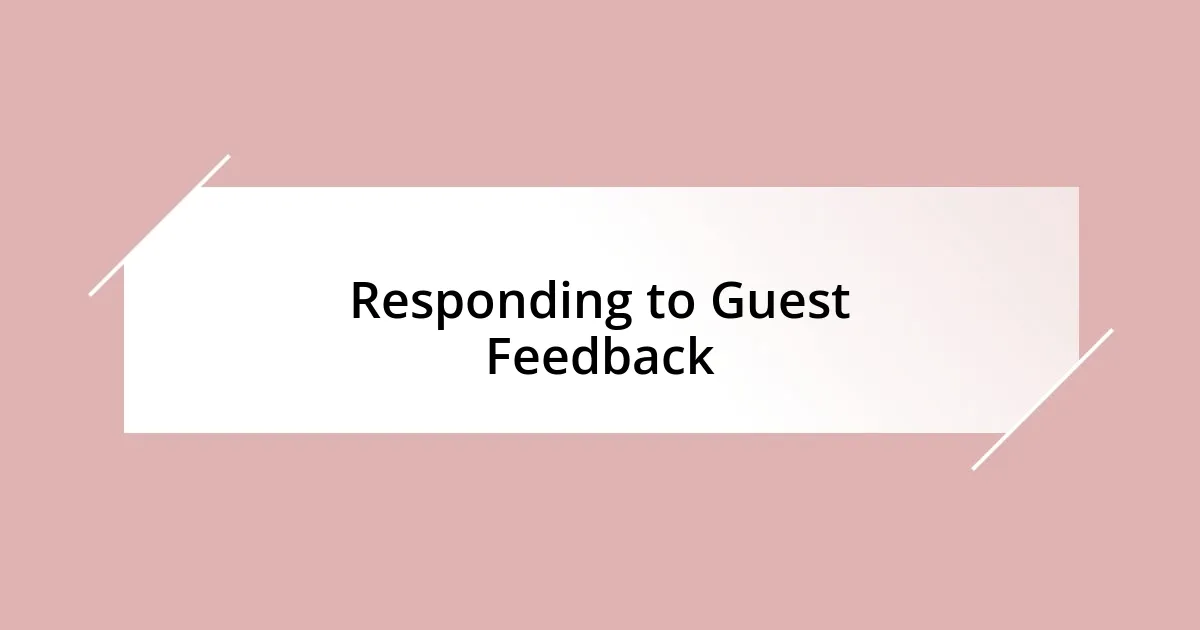
Responding to Guest Feedback
When it comes to responding to guest feedback, I’ve realized that timing is everything. There was a situation where a guest voiced concerns about noise from a nearby event. I made it a point to reply within minutes, acknowledging their frustration and offering solutions, like a room change if necessary. The immediate response not only calmed their worries but also built a sense of trust that I was genuinely invested in their experience. It’s interesting how a timely response can turn a potentially negative situation into a positive one.
Another important aspect I’ve learned is the power of personalization in responses. I remember a guest who left a comment about their favorite breakfast item not being available during their stay. I took the time to respond with, “I’m so sorry to hear that! I’ll make sure your favorite pancakes are on the menu next time. Thank you for sharing your thoughts!” Their reply was filled with gratitude, and it struck me how small gestures could make such a significant impact on the overall guest experience. Hasn’t anyone ever turned your day around with a simple acknowledgment?
Lastly, following up after addressing feedback is a practice I’ve come to appreciate deeply. After resolving an issue for a family that had a mix-up with their room, I sent them a quick message the next day, asking how everything was going. Their excitement in the reply—it felt like we had established a rapport beyond just hotel staff and guests. It’s moments like these that reinforce my belief that guest communication is not just about solving problems, but also about nurturing relationships that lead to memorable stays.
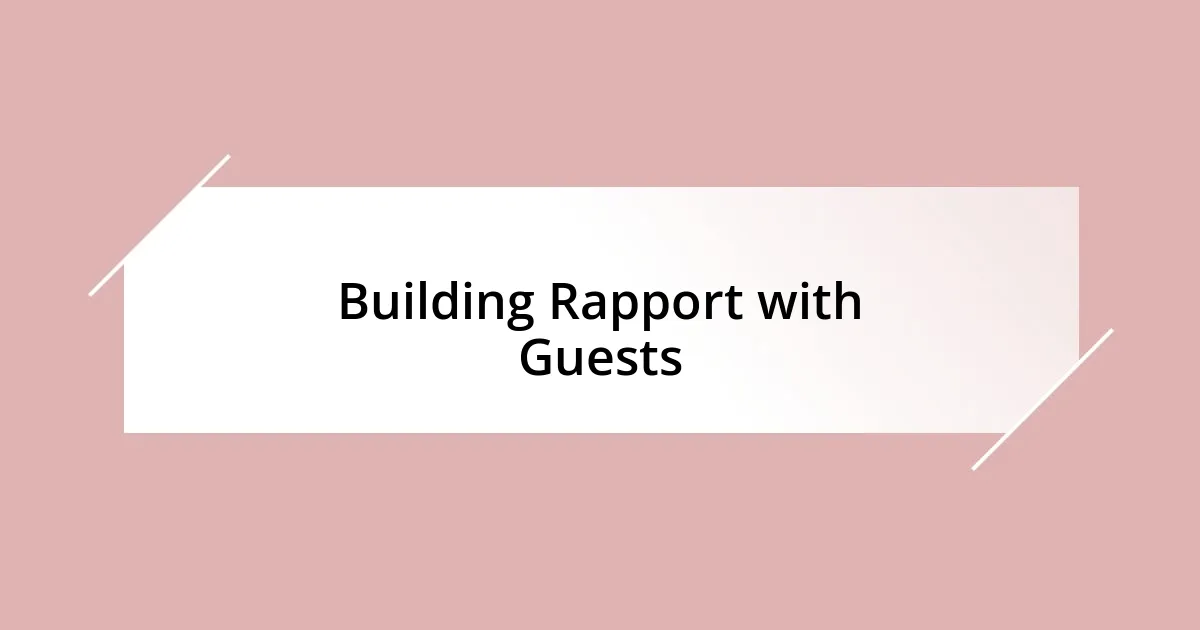
Building Rapport with Guests
Building rapport with guests often begins with a warm smile and a genuine greeting. I remember the first time a guest walked in looking a bit weary. Instead of jumping straight into formalities, I took a moment to ask, “How was your journey here?” This simple question seemed to lift a weight off their shoulders, and suddenly, we were no longer just a hotel and a guest; we were two people connecting over travel stories. It’s fascinating how a little humanity can open the door to rapport.
Creating an inviting atmosphere can also lead to strong connections. I often make an effort to personalize interactions by recalling details from past visits. On one occasion, I recognized a returning guest and mentioned how much I enjoyed hearing about their recent adventure to Italy. Their face lit up with excitement, and before I knew it, we were engaged in a delightful conversation that made their check-in experience not just transactional but memorable. Isn’t it amazing how remembering small details can have such a profound impact?
Finally, I’ve found that sharing a bit of myself fosters deeper relationships. During a late-night check-in, I shared a funny travel mishap that happened to me on a solo trip. The guest laughed heartily, and it broke down any lingering formality. This two-way communication reassured them that it’s okay to be human, and that’s when the walls truly came down. Building rapport isn’t just about the guest feeling comfortable; it’s about creating a space where both of us can share and connect authentically. Wouldn’t you agree that genuine interactions lead to the most memorable experiences?
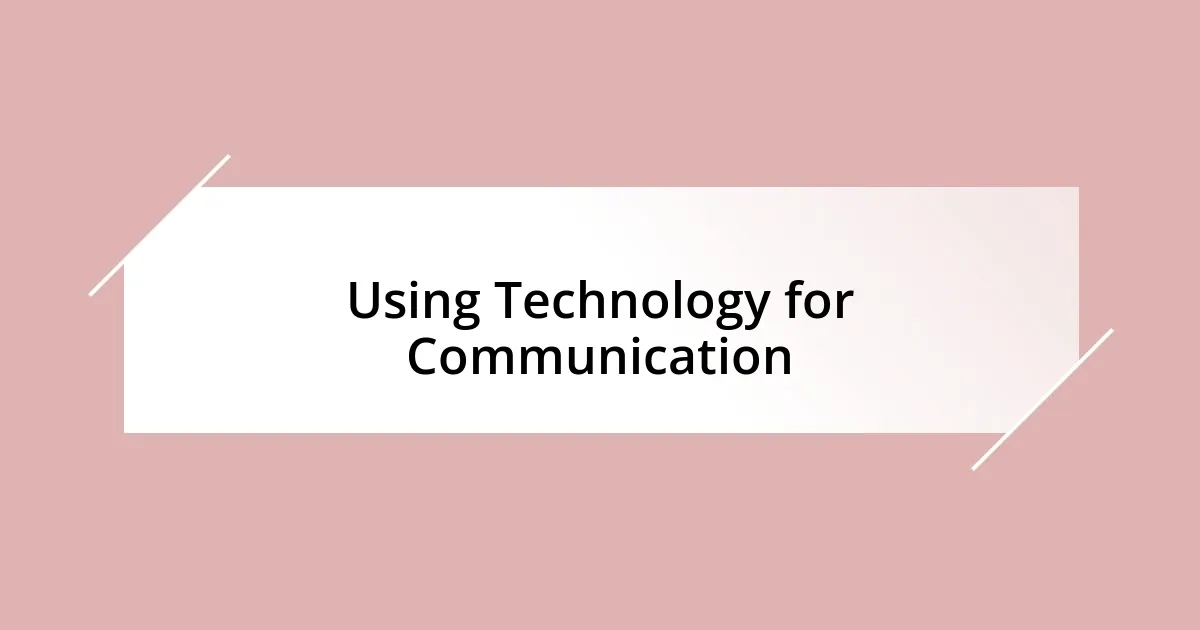
Using Technology for Communication
Using technology for communication has revolutionized the way we connect with guests. I vividly remember the relief I felt when I first started utilizing messaging apps to communicate with guests. One evening, a family was struggling to find their room after a long day of travel. Instead of sending someone to assist them physically, I quickly shot them a message with clear directions. It felt great knowing that technology allowed me to help them instantly, enhancing their experience without disrupting my workflow. Isn’t it fascinating how a simple text can bridge the distance between us?
Moreover, technology opens doors to proactive communication that I never thought possible. I once had a guest mention their dietary restrictions in an online survey before their arrival. I took that information and coordinated with our kitchen staff to prepare special meals that suited their needs. When they checked in, I excitedly told them about the arrangements we made. Seeing their surprised joy was a reminder of how technology, when used effectively, can create personalized experiences that leave a lasting impression. Who would have thought that a few keystrokes could transform a standard stay into something truly tailored?
Finally, I’ve come to appreciate the power of social media in fostering ongoing conversations with guests. After a recent event I hosted, I noticed a guest shared a delightful photo on Instagram. I took a moment to comment on their post, expressing how much fun it was to host them. Surprisingly, they replied, sharing their favorite part of the event. This little exchange felt like catching up with an old friend and reinforced how technology is not just a tool but a bridge that connects us in meaningful ways. Don’t you think that maintaining those connections can enrich both the guest experience and our own journey in the hospitality industry?
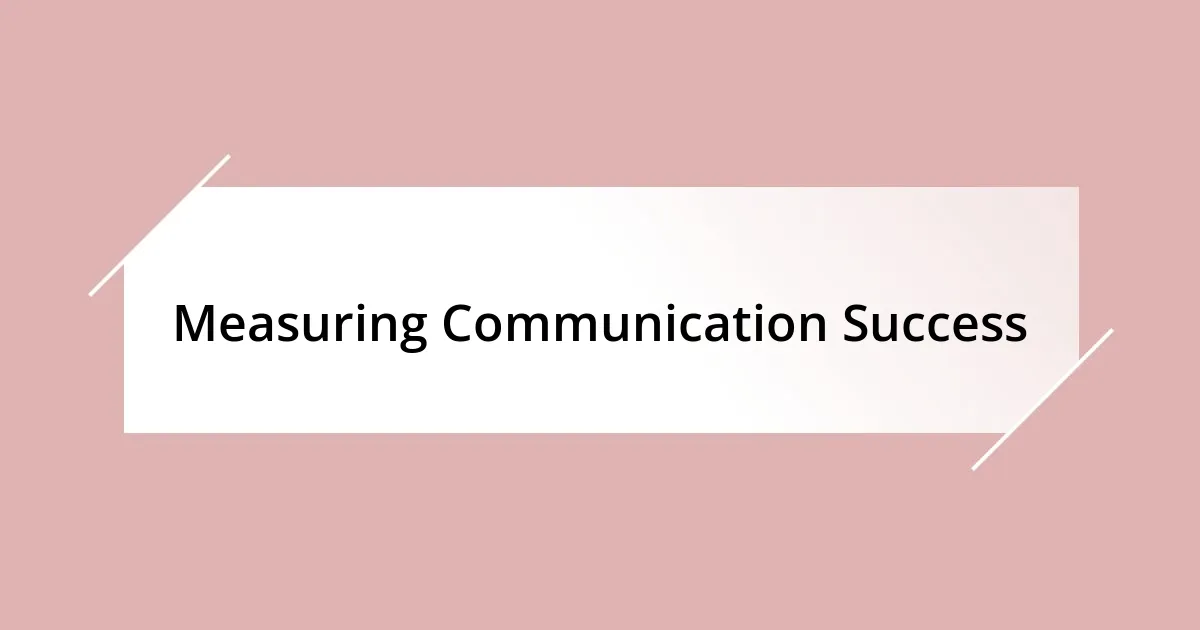
Measuring Communication Success
Measuring communication success isn’t just about numbers; it’s about understanding the impact of our interactions. I remember a time when I reviewed guest feedback after implementing a new messaging system. The results were striking! Guests expressed appreciation for the quick responses and felt more connected to the staff. These insights made me realize that positive feedback isn’t just a pat on the back; it’s a vital tool to refine our communication strategies.
In my experience, I’ve found that tracking engagement metrics can also be quite telling. For instance, I started keeping an eye on the response rates to my follow-up emails post-stay. Not only did I notice increased responses when I personalized my messages, but those emails often turned into conversations. It’s a rewarding feeling to see how meaningful communication can lead to deeper relationships with guests. Isn’t that gratifying?
Lastly, I have come to value the importance of guest surveys. After hosting a series of events, I took a leap and asked for detailed feedback about our communication before, during, and after the events. The responses were eye-opening! They highlighted areas where I could improve, from clearer pre-event notifications to better follow-up. This proactive approach to gathering insights has been invaluable. Who knew that a few thoughtful questions could lead to such transformational growth in our guest experience?












